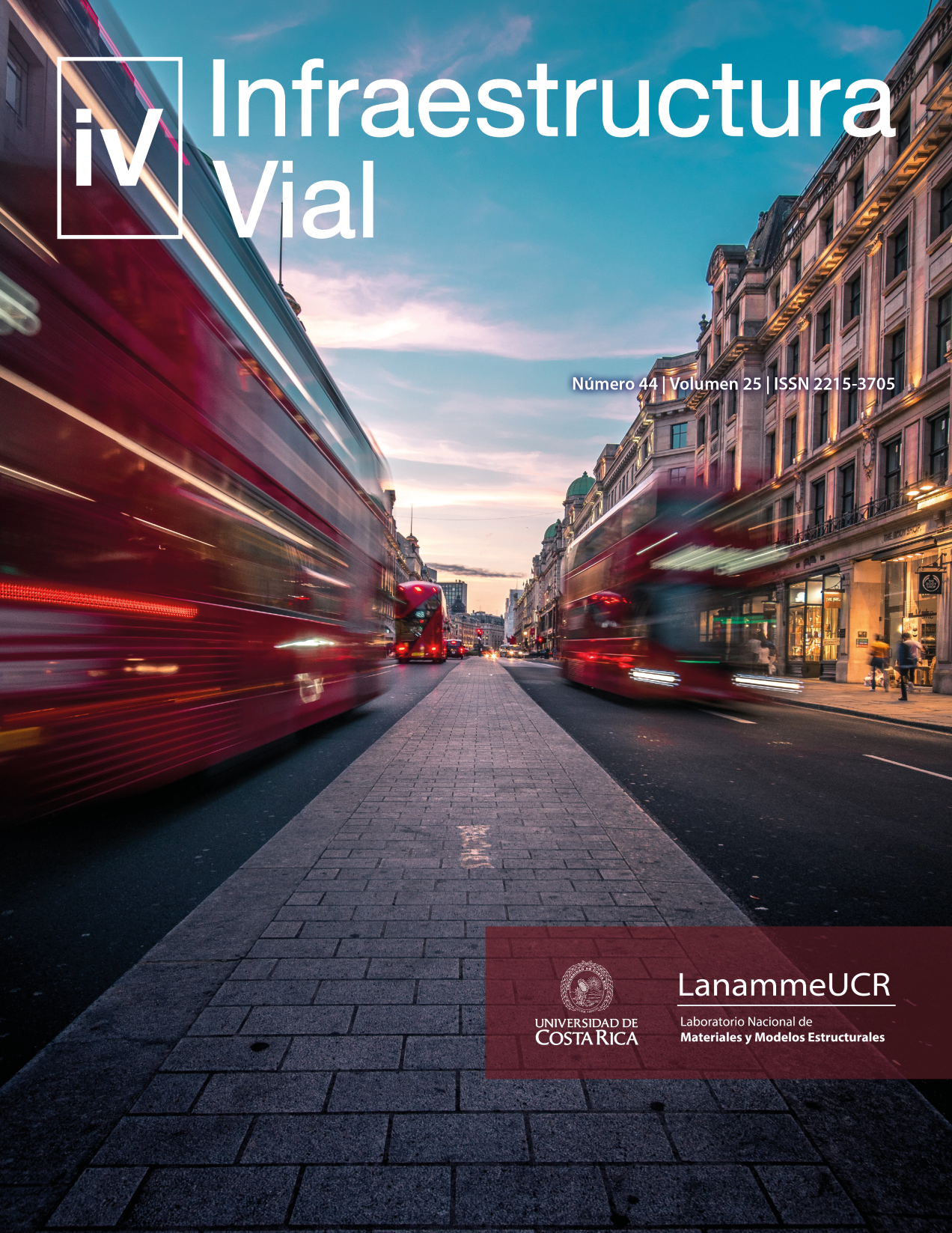Abstract
This study was developed by an experimental design of a hot mix asphalt (HMA), seeking to mitigate the negative impact on the environment that generate the recycled motor oils (RMO) or commonly known as burned oil which, in general, is eliminated outdoors. Then, RMO was added in percentages to an asphalt mixture in different percentages according to the PEN 60/70 of the standard mixture, with the objective of determining the resulting physical-mechanical properties of the modified asphalt mixture and evaluating if they meet the standards. A total population of 135 briquettes of modified mixtures was evaluated by means of the Marshall methodology. The mixtures contained 0,5 %, 1,5 %, 2,5 % and 3,5 % of recycled oil. It was found that the optimal percentage of asphalt is 5,75 %, rehearsed at temperatures of 120 °C and 130 °C. It is concluded that after incorporating RMO in the asphalt mixture, its physical-mechanical properties (rigidity, flow, stability) were improved and comply with the minimum parameters of an HMA stated by standards.
References
ASTM (2001a). Flat particles, elongated particles, or flat an elongated particles in coarse aggregate (ASTM D-4791). West Conshohocken: ASTM International.
ASTM (2001b). Práctica estándar para el muestreo de mezclas de pavimento bituminoso (ASTM D979-01). West Conshohocken: ASTM International.
Castillo, S., Yamasqui, R., y Areche, J. (2021). Comportamiento de las propiedades mecánicas de material reciclado de mezcla asfáltica con aceite de motor. Polo del Conocimiento, 6(10), 627-648. DOI:10.23857/pc.v6i10.3228
Del Castillo, R., y Orobio, A. (2020). Investigación exploratoria sobre el efecto del aceite de motor usado en el suelo fino de subrasante. Informes de la Construcción, 72(558), e336. DOI: 10.3989/ic.69016
Fox, M. (2016). The marketing, distribution and use of petroleum fuels. Enviromental Technology in the Oil Industry. En: Orszulik, S. (eds) Environmental Technology in the Oil Industry (pp. 393 – 437). Springer. DOI: 10.1007/978-3-319-24334-4_12
Mohi Ud Din, I., y Mohammad, S. M. (2021). Laboratory study on the use of reclaimed asphalt pavement and copper slag in warm mix asphalt pavements using waste engine oil as a rejuvenator. International Journal of Pavement Research and Technology, 15, 547-559. DOI: 10.1007/s42947-021-00036-y
Ivshina, I., Kuyukina, M., Krivoruchko, A., Elkin, A., Makarov, S., Cunnigham, C., Peshkur, T., Atlas, R., Philip, J. (2015). Oil spill problems and sustainable response strategies through new technologies. Environmental Science: Processes and Impacts, 17(7), 1201-1219. DOI: 10.1039/c5em00070j
Jia, X., Huang, B., Moore, J., y Zhao, S. (2015). Influence of waste engine oil on asphalt mixtures containing reclaimed asphalt pavement. Journal of Materials in Civil Engineering, 27(12), 1-9. DOI: 10.1061/(ASCE)MT.1943-5533.0001292
Kaplan, E., Kayadelen, C., Ozturk, M., y Oñal, Y. A. (2022). Experimental evaluation of the usability of palm tree pruning waste (PTPW) as an alternative to geotextile. Revista de la Construcción, 21(1), 69-82. DOI: 10.7764/RDLC.21.1.69
Li, J., Yu, M., Cui, X., y Wang, W. (2019). Properties and components of recycled engine oil bottom rejuvenated asphalt and its grey relationship analysis. Advances in Materials Science and Engineering, 19(1), 1-12. DOI: 10.1155/2019/2462487
Li, H., Zhang, F., Feng, Z., Li, W., y Zou, X. (2020). Study on waste engine oil and waste cooking oil on performance improvement of aged asphalt and application in reclaimed asphalt mixture. Construction and Building Materials, 276, 1-14. DOI: 10.1016/j.conbuildmat.2020.122138
Lopera, C., y Córdova, J. (2013). Warm mix asphalt design from mix asphalt and crude palm oil. Dyna, 80(179), 99-108. Recuperado de http://www.scielo.org.co/pdf/dyna/v80n179/v80n179a11.pdf
López, J., Allauca, F., Veloz, F., Zambrano, T., y Guilcapi, J. (2021). Energy recovery of the lubricating oil used in thermal combustion systems of the ecuadorian cement industry. Revista Digital Novasinergia, 1(2), 60-69. DOI: 10.37135/unach.ns.001.02.07
Mamun, A., Al-Abdul Wahhab, H.I. y Dalhat, M.A. (2020). Comparative evaluation of waste cooking oil and waste engine oil rejuvenated asphalt concrete mixtures. Arabian Jounal Science and Engineering, 45, 7987–7997. DOI: 10.1007/s13369-020-04523-5
Modibbo, S., Hartadi , M., Napiah, M., Usman, A., Batari, A., Yusri, M., y Aliyu, N. (2021). Optimization of rubber seed oil content as bio-oil rejuvenator and total water content for cold recycled asphalt mixtures using response surface methodology. Case Studies in Construction Materials, 15, e00561. DOI: 10.1016/j.cscm.2021.e00561
Quillos, S., Calderon, L., Escalante, N., y Nahui, J. (2021). Effect of the discharge of residual oils on the quality of the soil in the automotive workshops of the City of Chimbote. Proceedings of the LACCEI international Multi-conference for Engineering, Education and Technology, 23, 1-8. DOI: 10.18687/LACCEI2021.1.1.246
Sanchez, X., y Tighe, S. (2018). Steps towards the detection of reclaimed asphalt pavement in superpave mixtures. Road Materials and Pavement Design, 20(5), 1201-1214. DOI: 10.1080/14680629.2018.1428218
Taherkani, H., y Noorian, F. (2021). Investigating the Creep and Fatigue Properties of Recycled Asphalt Concrete Containing Waste Engine and Waste Cooking Oil. Proceedings of the RILEM International Symposium on Bituminous Materials. ISBM 2020. RILEM Bookseries, vol. 27. DOI: 10.1007/978-3-030-46455-4_146
Thomas, C., Nsonwu, A., Usoro, C., Agoro, E., y Idenyi, A. (2021). Hepato-renal toxicities associated with heavy metal contamination of water ources among residents of an oil contaminated area in Nigeria. Ecotoxicology and Enviromental Safety, 212, 111988. DOI: 10.1016/j.ecoenv.2021.111988
Xiao, Y., Wang, W., Wang, W., y Yuan, D. (2021). Viscoelasticity evaluation of regenerated asphalt containing waste engine oil based on rheological analysis. Earth and Environmental Science, 643(1), 1-9. DOI: 10.1088/1755-1315/643/1/012075
Yuan, L., Gao, Y. C., y Cheng, F. (2022). The influence of oil exploitation on the degradation of vegetation: A case study in the Yellow River Delta Nature Reserve, China. Environmental Technology & Innovation, 28, 102579. DOI: 10.1016/j.eti.2022.102579
##plugins.facebook.comentarios##

This work is licensed under a Creative Commons Attribution-NonCommercial 4.0 International License.
Copyright (c) 2023 Leyner Oswaldo Calva Herrera, Carlos Lucio Raffo Suclupe



